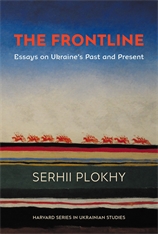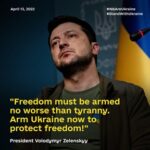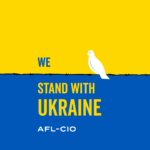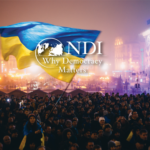The greatest theorist on war, Carl von Clausewitz, often explained that strategy must be dynamic, constantly changing and rejuvenating itself. In his famous treatise “On War,” he wrote that some generals “consider only unilateral action, whereas war consists of a continuous interaction of opposites,” says Washington Post columnist Fareed Zakaria.
The West needs to take these lessons to heart in its struggle with Russia and adjust its strategy — which is in danger of failing, he contends.
But the U.S. owes President Volodymyr Zelensky’s government a chance to win this war, on which Ukraine’s survival and the West’s security depend. We must give the Ukrainians what they need, when they need it, Brookings expert William Galston writes for The Wall Street Journal:
Working with our allies, the U.S. should give Mr. Zelensky’s government the estimated $5 billion a month that his government will need to maintain basic services during the economic collapse the invasion has created. According to a recent report from the Atlantic Council, “the race to resupply will be critical for both sides.”
 Ukraine has the will to achieve the operational defeat of the Russian military. At present, however, several Russian advantages and Ukrainian weaknesses are leading to an attritional conflict that risks a protracted war, eventually favoring Russia, say Chatham House analysts Jack Watling and Nick Reynolds:
Ukraine has the will to achieve the operational defeat of the Russian military. At present, however, several Russian advantages and Ukrainian weaknesses are leading to an attritional conflict that risks a protracted war, eventually favoring Russia, say Chatham House analysts Jack Watling and Nick Reynolds:
Ukrainian victory is possible, but only with international support. In the absence of that support Ukraine may either be worn down through attrition and economically strangled, or else fight a protracted and bloody war over several years. International support so far has been hugely consequential in enabling Ukraine to survive but has also been piecemeal and is introducing significant logistical frictions into the Ukrainian military.
President Vladimir Putin’s increasingly confrontational stance towards the West met no doubt or resistance within Russia’s foreign affairs elite, notes Boris Bondarev, who served as a diplomat for the Russian permanent mission at the un in Geneva from 2019 to 2022. As anti-Western propaganda intensified, older diplomats immediately recalled their seemingly forgotten Soviet-era skills, he writes for The Economist:
 Cables from all over the world began resembling old Soviet headlines from the 1930s. The poisoning of Sergei and Yulia Skripal in Britain in 2018 raised tensions to another level. I read cables which contained almost only slogans, insults of Western delegations and low-quality clichés. Professionalism was finally replaced by propaganda. Now it has become much more dangerous, as the Russian leadership relies, inter alia, on such reports and configures foreign policy on information that is either entirely or almost entirely false.
Cables from all over the world began resembling old Soviet headlines from the 1930s. The poisoning of Sergei and Yulia Skripal in Britain in 2018 raised tensions to another level. I read cables which contained almost only slogans, insults of Western delegations and low-quality clichés. Professionalism was finally replaced by propaganda. Now it has become much more dangerous, as the Russian leadership relies, inter alia, on such reports and configures foreign policy on information that is either entirely or almost entirely false.
Tsunami of servility
Russia’s recent aggression stems from brooding resentment left over from the 1990s, Bondarev adds. The Putin regime has been able to exploit such feelings in society, particularly because of the large number of people living in poverty and ignorance (worsened by domestic policies, of course). The tsunami of servility shown by my colleagues was the last straw.
Can Ukraine win? Yes. Will the Ukrainians win? Not yet clear, but the possibility should not be dismissed, strategist Lawrence Freedman writes for The New Statesman.
 The FSB, the successor to Stalin’s secret police, has grown even more repressive since Vladimir Putin invaded Ukraine. It controls the courts and prosecution service, and supports the war with purges of “extremists” and “traitors,” The Economist adds:
The FSB, the successor to Stalin’s secret police, has grown even more repressive since Vladimir Putin invaded Ukraine. It controls the courts and prosecution service, and supports the war with purges of “extremists” and “traitors,” The Economist adds:
The number of prosecutions for high treason and extremism has risen dramatically since Russia first invaded Ukraine in 2014, says Ivan Pavlov, a Russian human-rights lawyer who has fought several cases against the FSB. “The purpose is to demonstrate that Russia is surrounded by enemies,” he says. The definitions of treason and extremism keep broadening. A journalist gathering open-source information that might benefit a foreign power can be accused of treason.
Preventing a Russian victory in Ukraine “lies in Germany’s interest,” according to an open letter, initiated by the former Green politician Ralf Fücks and signed by 58 artists and intellectuals, including the Nobel literature prize recipient Herta Müller, the pianist Igor Levit and German PEN’s president, Deniz Yücel. “Those who want a negotiated peace that doesn’t result in Ukraine’s submission to Russian demands must increase [Ukraine’s] defensive capabilities and weaken Russia’s belligerency as much as possible,” it said.
 In his stance on the war in Ukraine, Germany’s leading philosopher has diverted discourse away from realities of the past and possibilities of the present, says a prominent historian.
In his stance on the war in Ukraine, Germany’s leading philosopher has diverted discourse away from realities of the past and possibilities of the present, says a prominent historian.
The most important German philosopher of the second half of the twentieth century—the 92-year-old Jürgen Habermas—entered the debate about an appropriate German reaction to Russia’s unprovoked invasion of Ukraine with an essay, “Krieg und Empörung,” notes analyst Birthe Mühlhoff. It was published prominently on the first two pages of the cultural section of Süddeutsche Zeitung, the most widely read daily newspaper in Germany, with an English translation published the same day, entitled, like the German version, “War and Indignation.”
Writing in the New Statesman, historian Adam Tooze rightly points out that Habermas is primarily concerned with distinguishing between clashing mentalities in the debate on Ukraine, she writes for The Point:
There is the “widely admired, heroic resistance and self-evident willingness to sacrifice displayed by the Ukrainian population,” and in stark contrast to this, the “post-heroic mentality” of our Western societies and old nation-states in which we count on our professional militaries and do not feel much need or passion for nationalism. Instead of saying which mentality is the better one—which may be what readers expect from such an analysis—Habermas stresses that “such differences should be accepted as fact,” and that “allies should not reproach each other for different political mentalities that historically do not match in view of being still involved in the becoming of a nation state or having passed that kind of formation process.”
 After Russia’s invasion of Georgia in 2008, after the annexation of Crimea in 2014, and after the poisoning of Alexei Navalny in 2020, Berlin has repeatedly shrugged and carried on. But Putin’s assault on Ukraine and Ukraine’s remarkable resistance have made that approach impossible, Tooze observes. The fact is that the problem of balancing Russia for Germany is real and that German foreign relations and German democracy are contentious, and healthily so. No one embodies that history more consistently than Jürgen Habermas.
After Russia’s invasion of Georgia in 2008, after the annexation of Crimea in 2014, and after the poisoning of Alexei Navalny in 2020, Berlin has repeatedly shrugged and carried on. But Putin’s assault on Ukraine and Ukraine’s remarkable resistance have made that approach impossible, Tooze observes. The fact is that the problem of balancing Russia for Germany is real and that German foreign relations and German democracy are contentious, and healthily so. No one embodies that history more consistently than Jürgen Habermas.
I have been researching and writing about Germany and Central Europe for over ten years based on my family history between Hitler and Stalin, notes Marcel Krueger. I now understand how democratic structures can fall to extremists if left unsupported. This leaves me, as a democrat, with no choice but to support the resistance of Ukraine to all of my abilities.
Denying Ukraine democracy is to apply stereotypes and prejudice and puts a lack of knowledge on public display, he writes for New Eastern Europe. This discussion taking place among Germans displays a willingness to view the war in the most abstract and simplistic ways.
Russia makes its own choices—however bad they are. https://t.co/nzZKuqlGEV
— Democracy Digest (@demdigest) July 8, 2022
Vladimir Putin has raised Hitlerian themes as justification for his war of destruction: the Ukrainians have no historical consciousness, no nationality of their own, no elite, Yale University historian Timothy Snyder observes. Like Hitler, and for that matter like Stalin, he seeks to use Ukrainian foodstuffs as a weapon. But a reader of Habermas is not asked to consider these resemblances, nor to inquire whether as Germans they might bear responsibility towards Ukraine: a country where Germans killed millions of people, not so very long ago.
 Of course, for Germans the memory of their own racist imperialism still haunts their decisions, adds analyst Natalia Antonova. They’re hesitant to be seen as too aggressive toward Russia, as evidenced by a long-standing “special relationship” with Moscow—but by conflating “Soviet” with “Russian,” the Germans are playing right into Putin’s hands. It was Ukraine that was the first victim of Adolf Hitler’s war on the Soviet Union, just as it was the first victim of Soviet terror itself, she writes for Foreign Policy.
Of course, for Germans the memory of their own racist imperialism still haunts their decisions, adds analyst Natalia Antonova. They’re hesitant to be seen as too aggressive toward Russia, as evidenced by a long-standing “special relationship” with Moscow—but by conflating “Soviet” with “Russian,” the Germans are playing right into Putin’s hands. It was Ukraine that was the first victim of Adolf Hitler’s war on the Soviet Union, just as it was the first victim of Soviet terror itself, she writes for Foreign Policy.
Germans are absolutely right that democracy depends upon a constant re-engagement with history, adds Snyder. They’re right when we say Russia has to engage its own past and so on. We should recognize that now the only country in Europe which says that you should engage with its past is Germany.
Does that mean that Germans are always correctly engaging with their own past? No. Because part of engaging with your own past is recognizing that your prior interpretations were not necessarily correct, he tells Euromaidan. In the German case, sometimes the politics has gone in a direction of what’s comfortable as Ostpolitik. In other words, if we’re going to express our guilt for the Second World War, let’s do so with respect to Moscow. But in order to have an honest Ostpolitik, history has to be included.
Jürgen Habermas, regarded as the greatest political philosopher in Europe, has written a text on its major contemporary crisis, the war in Ukraine..https://t.co/bXNfRLolQb
— Timothy Snyder (@TimothyDSnyder) June 29, 2022







